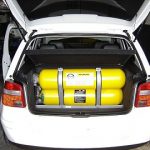Following the Federal Government’s push for cleaner and cheaper Compressed Natural Gas (CNG) as an alternative to petrol and diesel, experts outlined critical design considerations and safety measures for vehicle conversions.
Conversion Design Considerations
- Vehicle Compatibility
- Confirm the vehicle’s technical suitability for a CNG system.
- Upgrade engine components (e.g., pistons, cylinder head) to handle CNG’s higher octane rating.
- Fuel System Installation
- Install a CNG-specific system comprising a tank, regulator, and fuel injectors.
- Enhance the electrical system to support CNG components like the fuel computer and solenoids.
- Space Allocation
- Allocate space for the CNG tank and ensure weight distribution for vehicle stability.
Safety Precautions
- Tank Placement and Certification
- Install the CNG tank in a protected area, away from heat and impact zones.
- Use internationally certified tanks (e.g., ISO 11439).
- Fuel Line Protection
- Use protective sleeves to prevent damage to fuel lines.
- Leak Detection
- Install a system to alert the driver of potential gas leaks.
- Electrical Safety
- Ensure proper insulation and secure electrical connections.
- Pressure and Fire Safety
- Fit a pressure relief valve to avoid over-pressurization.
- Consider adding a fire suppression system.
- Regular Maintenance and Driver Training
- Schedule regular inspections and educate drivers on CNG-specific safety measures.
- Obtain certifications from authorized agencies (e.g., EPA, ISO).
Conversion Process
The vehicle conversion process should follow these steps:
- Pre-conversion Inspection: Assess the vehicle’s suitability.
- Design and Planning: Map out system components and installation.
- Component Installation: Fit CNG tank, fuel injectors, and other components.
- System Integration: Align the CNG system with the vehicle’s existing systems.
- Testing and Inspection: Verify system functionality and safety.
- Certification and Documentation: Obtain conversion certificates and update insurance coverage.
Environmental and Economic Benefits of CNG
- Environmental Advantages
- Reduced emissions:
- Greenhouse gases: 20-30% reduction.
- Carbon monoxide: 70-90% reduction.
- Nitrogen oxides: 50-70% reduction.
- Particulate matter: Significantly lower emissions.
- Reduced emissions:
- Economic Advantages
- Cost savings: CNG is 30-50% cheaper than gasoline.
- Increased fuel efficiency: Up to 20% improvement.
- Longer engine life: Cleaner-burning fuel reduces wear.
- Lower maintenance costs.
- Energy Security Benefits
- Reduced dependence on imported oil.
- Use of domestic natural gas resources.
- Diversified energy portfolio.
Government Incentives
- Tax credits for CNG conversions.
- Grants for alternative fuel infrastructure.
- Rebates for purchasing CNG-compatible vehicles.
Additional Operational and Social Benefits
- Operational: Smooth operation, consistent performance, compatibility with various vehicles.
- Social: Improved public image, enhanced corporate social responsibility, and potential access to priority parking.
By adopting CNG, vehicle owners can enjoy significant cost savings, improved engine performance, and reduced environmental impact while contributing to Nigeria’s energy security and sustainability.










